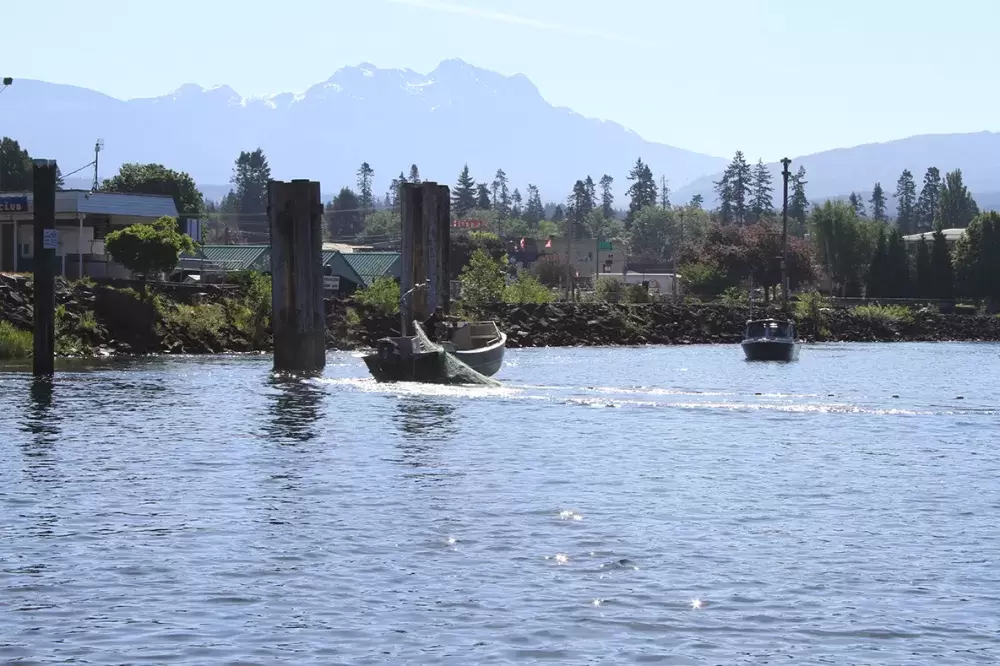Restrictions on chinook salmon fishing announced this spring have made Barkley and Nootka sounds some of the few locations where the fish can be caught by anglers on the West Coast. But this recreational opportunity is raising fears among Nuu-chah-nulth fisheries managers that their territorial stocks could be put at risk.
This was the major concern heard by Eric Angel, Uu-a-thluk fisheries manager, during a meeting of representatives from Nuu-chah-nulth communities on May 3.
“The main one is that there’s going to be a big increase in sports fishing activity, both now in Barkley Sound and Nootka Sound because of the waters being open there, and then later because of the two-a-day limit retention,” he said. “That’s going to put a whole bunch more pressure on our stocks.”
Currently Fisheries and Oceans Canada is permitting recreational fishers to keep two chinook salmon a day in the west coast of Vancouver Island’s inshore areas, which include Barkley and Nootka Sound and the Alberni and Muchalat inlets that they respectively lead to. Total seasonal catches have been limited to 10 chinook from the usual quota of 30.
On July 15 and afterwards the DFO is allowing two chinook a day off the west coast of the Island, but until then no retention of the fish will be permitted, including for First Nations food, social and ceremonial purposes.
“Please be advised that the waters beyond one nautical mile seaward is closed to fishing for chinook salmon,” stated a recent notice from Tla-o-qui-aht Fisheries Manager Andrew Jackson. “You can fish beyond one nautical mile but only for halibut, all chinook salmon must be released.”
The DFO announced these stringent conservation measures on April 16 to protect dwindling stocks that migrate from the Fraser River. The federal department noted that the Committee on the Status of Endangered Wildlife in Canada assessed 13 stocks of chinook salmon that originate from the Fraser to find that seven are endangered, with another four listed as “threatened”.
“The science is clear: Pacific Chinook salmon are in a critical state,” stated Jonathan Wilkinson, minister of Fisheries, Oceans and the Canadian Coast Guard. “Without immediate action, this species could be lost forever.”
This year for most of the B.C. coast immediate action entails delaying the sports fishery for chinook until July 15, with the commercial trollers being pushed back to August. On the Fraser River recreational chinook fishing is closed until at least Aug. 23, a measure that the DFO plans to enforce with 140 patrolling conservation officers.
In its announcements the DFO has admitted that last year’s restrictions weren’t enough to protect the endangered stocks.
“These new measure are difficult, but they are necessary to address Fraser River chinook decline,” stated the federal department. “A continued decline would irrevocably harm species that depend on the survival of chinook salmon, such as the Southern Resident Killer Whale.”
Angel suspects that the Fraser chinook are getting particular attention this year due to the government’s priority on protecting the endangered Southern Residents.
“West coast Vancouver Island chinook are also a serious concern from a conservation perspective, and yet the focus this year is exclusively on Fraser chinook,” he said. “The reason why would seem to be that they’re known for being food for the killer whales.”
The NTC’s fisheries manager would like to see more resources put into data collection on what stocks are found off of the island’s west coast to better inform the DFO’s conservation measures.
“It’s still this piecemeal approach to conservation that’s not seeing the connections between different parts of the system. You work one side of it to try to create some help there, but you end up imposing consequences on another part of the system,” he said. “We’ve got more and more conservation concerns with some of the additional uncertainty around climate change and what’s going on in the ocean, the only thing that’s going to allow us to maintain these fisheries is really good data on what we’re catching and what the impacts are.”







